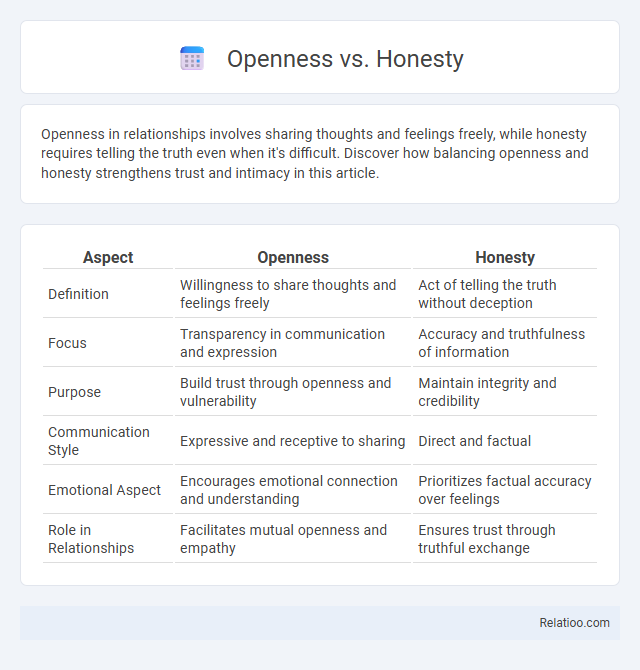Openness in relationships involves sharing thoughts and feelings freely, while honesty requires telling the truth even when it's difficult. Discover how balancing openness and honesty strengthens trust and intimacy in this article.
Table of Comparison
| Aspect | Openness | Honesty |
|---|---|---|
| Definition | Willingness to share thoughts and feelings freely | Act of telling the truth without deception |
| Focus | Transparency in communication and expression | Accuracy and truthfulness of information |
| Purpose | Build trust through openness and vulnerability | Maintain integrity and credibility |
| Communication Style | Expressive and receptive to sharing | Direct and factual |
| Emotional Aspect | Encourages emotional connection and understanding | Prioritizes factual accuracy over feelings |
| Role in Relationships | Facilitates mutual openness and empathy | Ensures trust through truthful exchange |
Defining Openness and Honesty
Openness refers to the willingness to share thoughts, feelings, and information transparently without withholding or concealing, fostering trust and collaboration. Honesty emphasizes truthfulness and accuracy in communication, ensuring information shared is factual and sincere. While openness involves a broad scope of sharing, honesty specifically targets the integrity and authenticity of the content disclosed.
Key Differences Between Openness and Honesty
Openness involves sharing thoughts, feelings, and information freely, emphasizing transparency and willingness to communicate without withholding details. Honesty centers on truthfulness, ensuring that the information shared is accurate and sincere, avoiding deception or lies. The key difference lies in openness being about the extent and willingness to share, while honesty focuses on the veracity and integrity of the shared content.
The Role of Intent in Communication
Intent plays a crucial role in distinguishing openness from honesty in communication, as openness involves sharing thoughts and feelings with transparency, while honesty emphasizes truthful expression regardless of the level of disclosure. Openness requires a willingness to be vulnerable and share internal states, aiming to build trust and deeper understanding, whereas honesty centers on factual accuracy and integrity without necessarily revealing the full emotional context. The interplay between intent and message impacts how information is received and interpreted, influencing relationship dynamics and communication effectiveness.
Benefits of Practicing Openness
Practicing openness fosters transparent communication, builds trust, and encourages collaboration in personal and professional relationships. Embracing openness allows for the free exchange of ideas, leading to increased creativity and problem-solving capabilities. Consistently demonstrating openness enhances emotional intelligence, promotes vulnerability, and strengthens connections by creating a safe space for authentic interactions.
The Value of Honesty in Relationships
Honesty serves as the cornerstone of trust and emotional intimacy in relationships, fostering genuine connections and mutual respect. Your willingness to communicate truthfully helps prevent misunderstandings and builds a solid foundation for long-term commitment. By valuing honesty, relationships thrive with transparency and deeper understanding between partners.
When Openness Becomes Oversharing
When openness crosses the boundary into oversharing, it can compromise personal and professional relationships by revealing too much sensitive or irrelevant information. Honesty remains crucial, but balancing transparency with discretion ensures that Your communication fosters trust without overwhelming or discomforting others. Maintaining appropriate boundaries protects Your privacy while promoting meaningful and respectful interactions.
Balancing Truth with Sensitivity
Balancing truth with sensitivity requires embracing honesty by sharing factual information clearly while practicing openness through empathy and thoughtful communication. Honesty builds trust by ensuring accurate, transparent exchanges, whereas openness fosters understanding by considering others' feelings and perspectives. Successful communication integrates both honesty and openness to create truthful yet compassionate interactions.
Navigating Difficult Conversations
Navigating difficult conversations requires balancing openness and honesty to foster trust without causing unintended harm. Openness involves sharing thoughts and feelings transparently, while honesty ensures accuracy and truthfulness in communication. Prioritizing empathetic expression and active listening helps maintain respect and understanding during challenging dialogues.
Openness vs Honesty in Professional Settings
Openness in professional settings emphasizes transparent communication and sharing of ideas, fostering collaboration and innovation, while honesty focuses on conveying truthful information and maintaining integrity in all interactions. Balancing openness and honesty is crucial for building trust and creating an ethical workplace culture, reducing misunderstandings and enhancing team dynamics. Prioritizing honest openness leads to clearer expectations and accountability, essential for effective leadership and decision-making.
Cultivating Trust Through Openness and Honesty
Cultivating trust through openness and honesty involves consistently sharing your thoughts and feelings with transparency, fostering a safe environment for genuine communication. Openness encourages vulnerability and sharing perspectives without judgment, while honesty emphasizes truthfulness and integrity in all interactions. By balancing both qualities, you strengthen relationships and build a foundation of trust that supports collaboration and mutual respect.

Infographic: Openness vs Honesty
 relatioo.com
relatioo.com